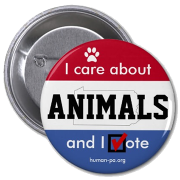HB 846, Victoria’s Law has been introduced by Representative Jeanne McNeill
BACKGROUND: Selling commercially raised puppies in pet store raises serious animal welfare and consumer protection issues. By prohibiting pet stores from selling dogs but allowing them to partner with shelters and rescues to host adoption events and sell products and services, lawmakers can protect consumers and promote humane businesses.
- Six states and over 440 localities, including Philadelphia, Pittsburgh, Wilkinsburg, Sharpsburg, Bellevue, Allentown and Easton, prohibit the sale of dogs, cats and rabbits in pet stores.
- These laws have shrunk demand for puppies bred in cruel conditions, with public records showing that 32,000 fewer breeding dogs are now caged in USDA-licensed puppy mills than ten years ago.
- With passage of New York’s humane pet store law, Pennsylvania is at risk of an influx of bad actors looking for a safe haven in a neighboring state.
THE PROBLEM WITH PUPPY-SELLING PET STORES
Puppy-selling pet stores pose numerous, unique issues for animals and consumers, including:
- Puppy mills: Public records show that Pennsylvania pet stores source puppies from puppy mills with terrible animal welfare records. Neither federal nor state law requires humane treatment of breeding dogs.
- The Pipeline: Pet store puppies are born into cruel and unsanitary conditions, taken from their mothers at just 7-8 weeks old, crammed into cages and trucked across the country in close proximity to other stressed and sick puppies, and then placed in pet store cages to be handled by inexperienced staff and consumers.
- Misleading sales tactics: Pet stores sell puppies for thousands of dollars with false promises of humane, regulated breeders and healthy, socialized puppies when this is rarely true.
- Sick puppies: The HSUS, government agencies, veterinarians, and online platforms receive a constant stream of complaints from consumers who ended up with sick pet store puppies, high veterinary bills, and sometimes the heartache of their new pet dying.
- Predatory lending: Pet stores often push financing options on customers with promises of low or no interest rates, but consumers have ended up with interest rates as high as 198%.
- Zoonotic disease: The American Medical Association and the CDC have warned of the health risks posed by pet store puppies, noting that antibiotic-resistant infections continue to cause serious illness to pet store customers and employees.
THE HUMANE ALTERNATIVE
This law would drive the market towards pet sources that are better for animals and families and pet stores that do not sell puppies, but rather offer pet owners all the products and services they need.
- Residents will be able to obtain the pet of their choice from choice by adopting from a local shelter or rescue or seeking out a responsible breeder who sells directly to the public.
Pet Store Industry Trends
According to the American Pet Products Association:
- Dog and cat sales were not tracked for the third year in a row because they are a “relatively small contributor to overall sales” and are “typically obtained outside of the retail pet channel.”
- “The numbers don’t lie: The pet industry has shown itself to be incredibly strong and resilient with a record-breaking two years…We expect continued growth.”
According to Pet Business Magazine, of the top 30 pet retailers in North America only one (Petland) sells puppies. “Despite an ongoing pandemic, turbulent economy, supply chain disruptions, and increasing competition” many on the list achieved “impressive growth over the past year.” In fact, more than half of the top retailers expanded in 2021.
According to Morgan Stanley, the pet industry is “poised to nearly triple to $275 billion by 2030 thanks to a surge in new owners, favorable demographics and increased per-pet spending.” Pet owners, especially younger ones, are spending incrementally more on pet products and services and that growth will likely continue.
According to the World Pet Association, in 2019 pet stores that only sold dry goods reported more total revenue per square foot ($403) than those that sold animals ($246).
Pennsylvania Pet Industry Leaders
Dozens of local pet stores prove that selling puppies is not necessary to run a thriving pet store, including:
- Woof Gang Bakery & Grooming: With a location in Pittsburg, this pet store chain’s owners attribute their success and recent expansion to listening to their customers and adding services. They have been vocal in their opposition to selling puppies in pet stores, stating that “good pet stores do not sell puppies and responsible pet breeders do not sell to stores.”
- Doggie Style Pets: This locally owned and operated Philadelphia-area pet food and supplies chain has been the neighborhood “watering dish” for the last 15 years. They partner with a local animal rescue and have at least two adoptable dogs at each location to help with the animal homelessness crisis in the area.
- Zoomania: This Harrisburg store offers a wide range of pet food and supplies and hosts special events to offer dogs and cats for adoption.
- Pickering Valley Feed and Farm: Since 1977, this store has been a staple in Extron for those with pets or farms. The store offers a wide range of pet food and supplies, plus fish aquariums and reptile habitats.
- Pet Supplies Plus: This chain, with several stores in PA, offers a wide variety of pet food and products as well as self-serve dog wash stations. Many locations also offer grooming, delivery and curbside pickup.
USDA’S BETRAYAL OF DOGS
- Confine dogs in cages only 6 inches larger than their bodies
- Keep hundreds of dogs in stack or elevated cages
- Provide only wire flooring
- Expose dogs to frigid or sweltering temperatures for hours
- Breed dogs repeatedly and excessively, without limits
- Deny hands on veterinary care to sick or injured dogs
- Kill dogs they no longer want
A USDA license has never meant a facility was humane, as standards have always been shockingly low and enforcement has always lacked. In 2010, the Office of Inspector General reported that enforcement was ineffective against problem dealers. In 2021, the Inspector General reported that not much has changed as “[the USDA] is not able to ensure the overall health and humane treatment of animals at [dog breeding] facilities.”
THESE PUPPY MILLS REMAIN LICENSED YEAR AFTER YEAR AND CONTINUE SELLING TO PET STORES:
USDA’S PRIORITIES ARE CLEAR: PROMOTE AND PROTECT PUPPY MILLS
- 2022 Horrible Hundred: The Humane Society of the United States publishes a annual Horrible Hundred Report which documents instances of breeders with numerous and egregious violations spanning years who remain licensed and breeders who had been cited by state officials for numerous and severe violations but received clean inspection reports from USDA.
- Shocking cruelty: After 4 years of no significant enforcement actions against commercial breeders and not a single license revoked, USDA revoked a license, but only after “shocking cruelty” was allowed to occur for months and over 120 animal welfare citations were issued.
- Virtual Inspections: Since 2020,USDA has givenbreeders significant control over how and when inspections occur and if inspections occur at all. In a notice to licensees, USDA told breeders they could avoid in-person inspections by stating COVID safety concerns and that remote/virtual inspections would be allowed.
- Few inspectors: In May 2020, USDA told stakeholders it had only 95 inspectors charged with inspecting more than 8,000 pet dealers, exhibitors, and research facilities and that they inspect over 1 million animals.
- Data purge: In February 2020, Congress forced USDA to restore unredacted inspection reports on the online database that it had unexpectedly purged three years earlier. Restored records confirmed USDA is recording violations far less than it used to and facilities are routinely refusing access to USDA inspectors.
- Partnering with puppy mills: The Washington Post reported that USDA leaders told inspectors of a new policy that emphasized “education, not enforcement” and treating regulated entities “more as partners than as potential offenders.”
- A USDA veterinarian who oversaw inspectors in 27 states told the Post the weakened enforcement had caused an “untold number of animals” to experience unnecessary suffering.
- A USDA inspector for 20 years who left at the end of 2017 told the Post:“It feels like your hands are tied behind your back. You can’t do many things you’re supposed to when it comes to protecting animals.”


